The virus outbreak has affected my life
VerifiedAdded on 2022/07/28
|8
|2177
|53
AI Summary
Contribute Materials
Your contribution can guide someone’s learning journey. Share your
documents today.

Name of student:
Registration number:
Unit title:
Unit Code:
Assignment title:
Name of supervisor:
Date due:
Registration number:
Unit title:
Unit Code:
Assignment title:
Name of supervisor:
Date due:
Secure Best Marks with AI Grader
Need help grading? Try our AI Grader for instant feedback on your assignments.
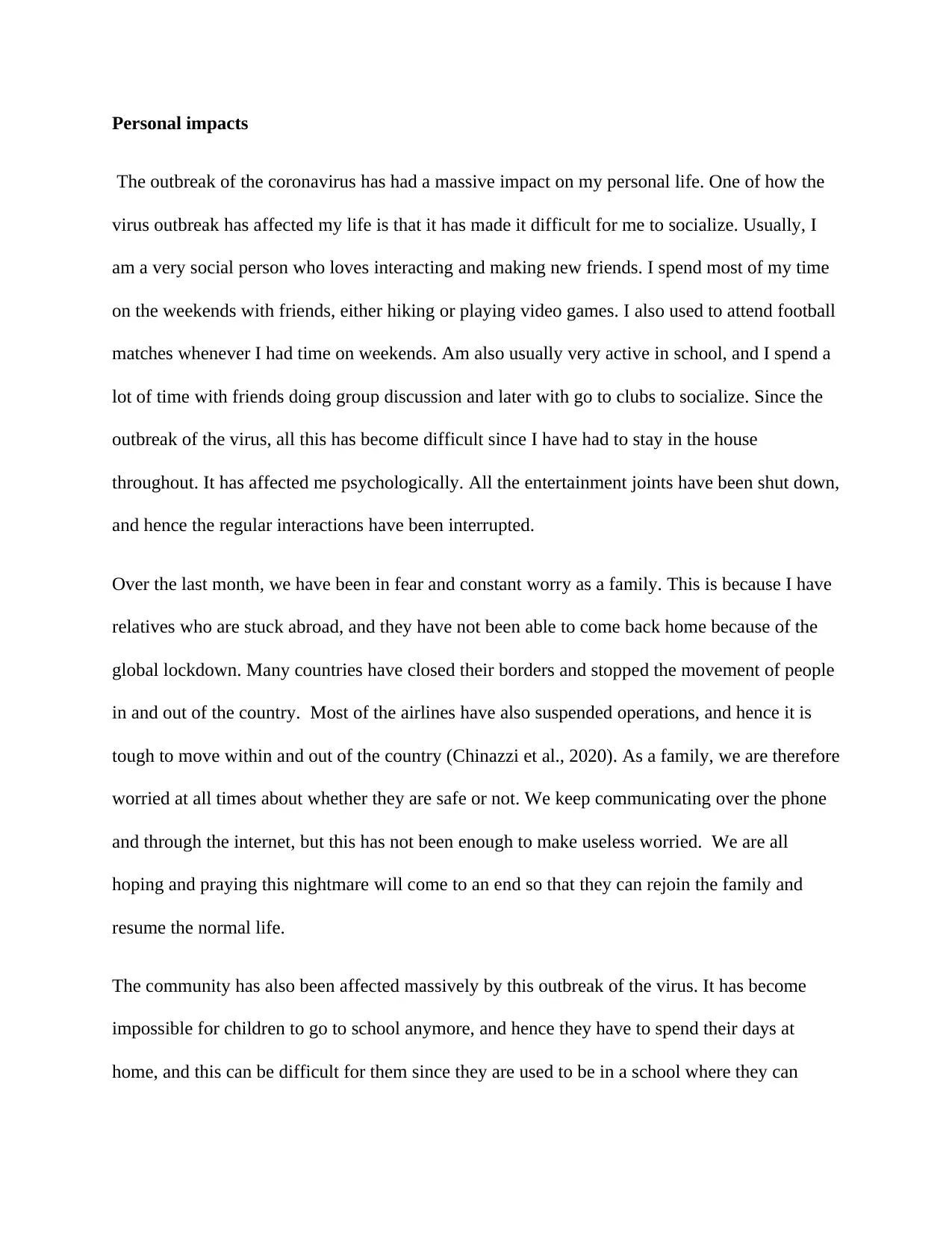
Personal impacts
The outbreak of the coronavirus has had a massive impact on my personal life. One of how the
virus outbreak has affected my life is that it has made it difficult for me to socialize. Usually, I
am a very social person who loves interacting and making new friends. I spend most of my time
on the weekends with friends, either hiking or playing video games. I also used to attend football
matches whenever I had time on weekends. Am also usually very active in school, and I spend a
lot of time with friends doing group discussion and later with go to clubs to socialize. Since the
outbreak of the virus, all this has become difficult since I have had to stay in the house
throughout. It has affected me psychologically. All the entertainment joints have been shut down,
and hence the regular interactions have been interrupted.
Over the last month, we have been in fear and constant worry as a family. This is because I have
relatives who are stuck abroad, and they have not been able to come back home because of the
global lockdown. Many countries have closed their borders and stopped the movement of people
in and out of the country. Most of the airlines have also suspended operations, and hence it is
tough to move within and out of the country (Chinazzi et al., 2020). As a family, we are therefore
worried at all times about whether they are safe or not. We keep communicating over the phone
and through the internet, but this has not been enough to make useless worried. We are all
hoping and praying this nightmare will come to an end so that they can rejoin the family and
resume the normal life.
The community has also been affected massively by this outbreak of the virus. It has become
impossible for children to go to school anymore, and hence they have to spend their days at
home, and this can be difficult for them since they are used to be in a school where they can
The outbreak of the coronavirus has had a massive impact on my personal life. One of how the
virus outbreak has affected my life is that it has made it difficult for me to socialize. Usually, I
am a very social person who loves interacting and making new friends. I spend most of my time
on the weekends with friends, either hiking or playing video games. I also used to attend football
matches whenever I had time on weekends. Am also usually very active in school, and I spend a
lot of time with friends doing group discussion and later with go to clubs to socialize. Since the
outbreak of the virus, all this has become difficult since I have had to stay in the house
throughout. It has affected me psychologically. All the entertainment joints have been shut down,
and hence the regular interactions have been interrupted.
Over the last month, we have been in fear and constant worry as a family. This is because I have
relatives who are stuck abroad, and they have not been able to come back home because of the
global lockdown. Many countries have closed their borders and stopped the movement of people
in and out of the country. Most of the airlines have also suspended operations, and hence it is
tough to move within and out of the country (Chinazzi et al., 2020). As a family, we are therefore
worried at all times about whether they are safe or not. We keep communicating over the phone
and through the internet, but this has not been enough to make useless worried. We are all
hoping and praying this nightmare will come to an end so that they can rejoin the family and
resume the normal life.
The community has also been affected massively by this outbreak of the virus. It has become
impossible for children to go to school anymore, and hence they have to spend their days at
home, and this can be difficult for them since they are used to be in a school where they can
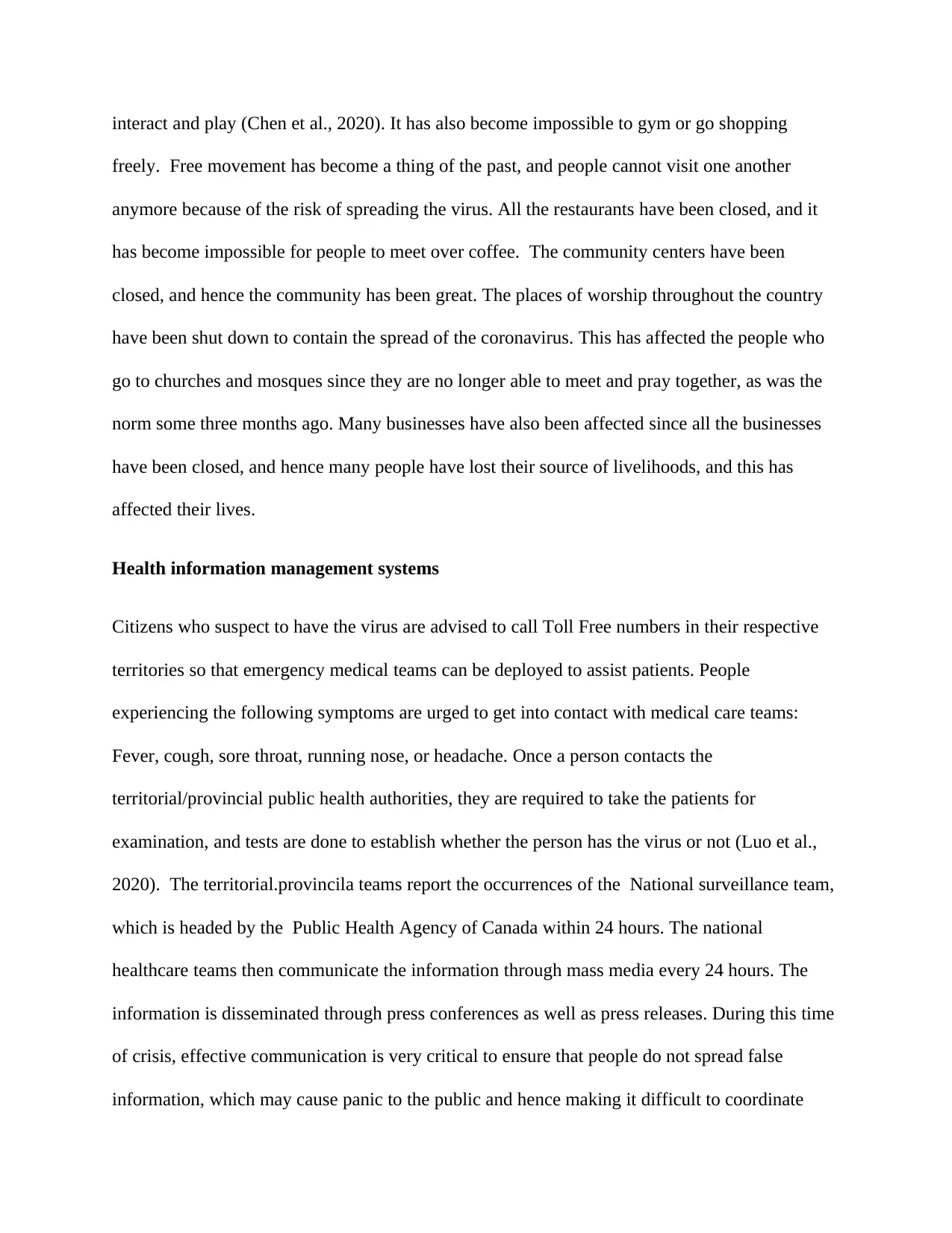
interact and play (Chen et al., 2020). It has also become impossible to gym or go shopping
freely. Free movement has become a thing of the past, and people cannot visit one another
anymore because of the risk of spreading the virus. All the restaurants have been closed, and it
has become impossible for people to meet over coffee. The community centers have been
closed, and hence the community has been great. The places of worship throughout the country
have been shut down to contain the spread of the coronavirus. This has affected the people who
go to churches and mosques since they are no longer able to meet and pray together, as was the
norm some three months ago. Many businesses have also been affected since all the businesses
have been closed, and hence many people have lost their source of livelihoods, and this has
affected their lives.
Health information management systems
Citizens who suspect to have the virus are advised to call Toll Free numbers in their respective
territories so that emergency medical teams can be deployed to assist patients. People
experiencing the following symptoms are urged to get into contact with medical care teams:
Fever, cough, sore throat, running nose, or headache. Once a person contacts the
territorial/provincial public health authorities, they are required to take the patients for
examination, and tests are done to establish whether the person has the virus or not (Luo et al.,
2020). The territorial.provincila teams report the occurrences of the National surveillance team,
which is headed by the Public Health Agency of Canada within 24 hours. The national
healthcare teams then communicate the information through mass media every 24 hours. The
information is disseminated through press conferences as well as press releases. During this time
of crisis, effective communication is very critical to ensure that people do not spread false
information, which may cause panic to the public and hence making it difficult to coordinate
freely. Free movement has become a thing of the past, and people cannot visit one another
anymore because of the risk of spreading the virus. All the restaurants have been closed, and it
has become impossible for people to meet over coffee. The community centers have been
closed, and hence the community has been great. The places of worship throughout the country
have been shut down to contain the spread of the coronavirus. This has affected the people who
go to churches and mosques since they are no longer able to meet and pray together, as was the
norm some three months ago. Many businesses have also been affected since all the businesses
have been closed, and hence many people have lost their source of livelihoods, and this has
affected their lives.
Health information management systems
Citizens who suspect to have the virus are advised to call Toll Free numbers in their respective
territories so that emergency medical teams can be deployed to assist patients. People
experiencing the following symptoms are urged to get into contact with medical care teams:
Fever, cough, sore throat, running nose, or headache. Once a person contacts the
territorial/provincial public health authorities, they are required to take the patients for
examination, and tests are done to establish whether the person has the virus or not (Luo et al.,
2020). The territorial.provincila teams report the occurrences of the National surveillance team,
which is headed by the Public Health Agency of Canada within 24 hours. The national
healthcare teams then communicate the information through mass media every 24 hours. The
information is disseminated through press conferences as well as press releases. During this time
of crisis, effective communication is very critical to ensure that people do not spread false
information, which may cause panic to the public and hence making it difficult to coordinate
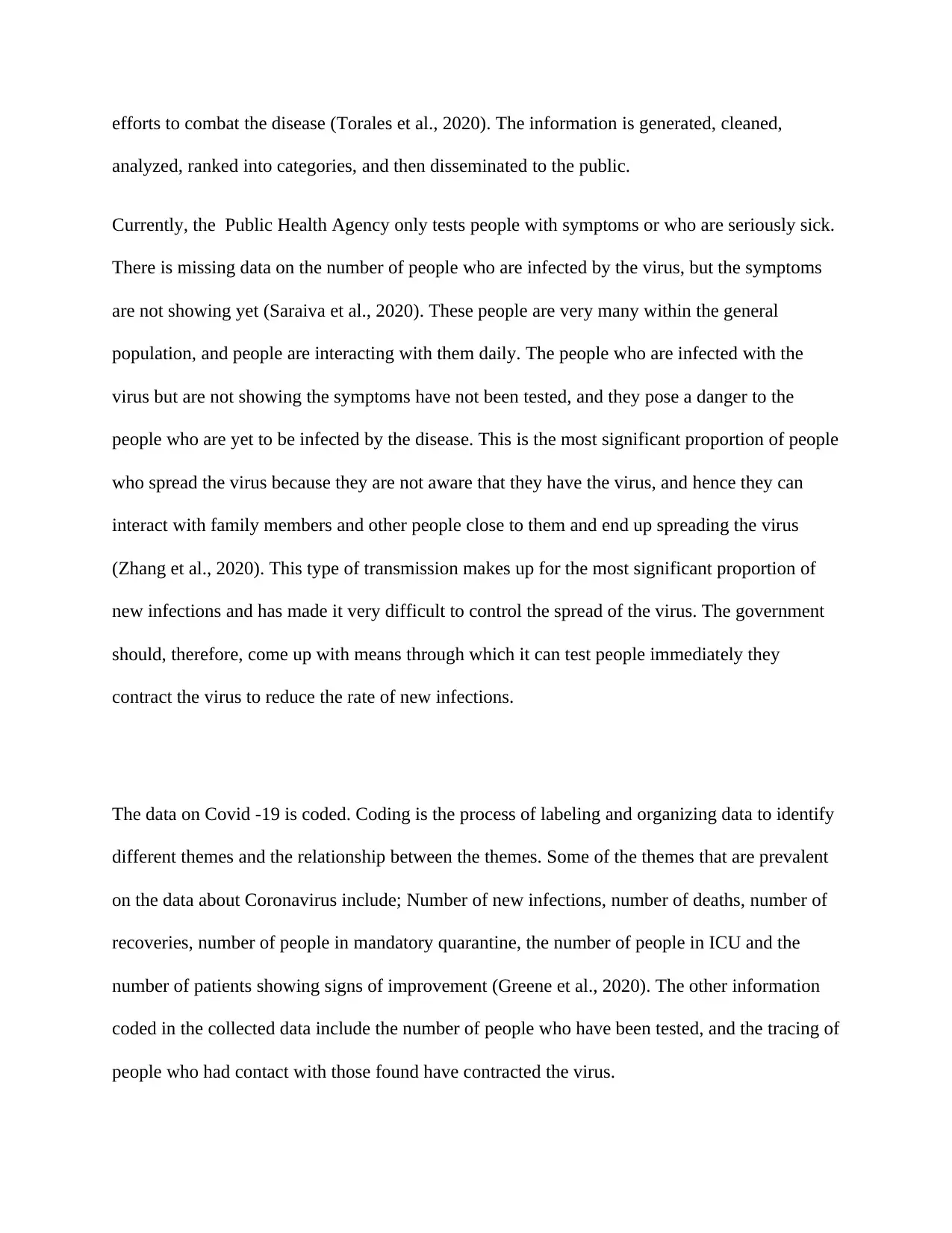
efforts to combat the disease (Torales et al., 2020). The information is generated, cleaned,
analyzed, ranked into categories, and then disseminated to the public.
Currently, the Public Health Agency only tests people with symptoms or who are seriously sick.
There is missing data on the number of people who are infected by the virus, but the symptoms
are not showing yet (Saraiva et al., 2020). These people are very many within the general
population, and people are interacting with them daily. The people who are infected with the
virus but are not showing the symptoms have not been tested, and they pose a danger to the
people who are yet to be infected by the disease. This is the most significant proportion of people
who spread the virus because they are not aware that they have the virus, and hence they can
interact with family members and other people close to them and end up spreading the virus
(Zhang et al., 2020). This type of transmission makes up for the most significant proportion of
new infections and has made it very difficult to control the spread of the virus. The government
should, therefore, come up with means through which it can test people immediately they
contract the virus to reduce the rate of new infections.
The data on Covid -19 is coded. Coding is the process of labeling and organizing data to identify
different themes and the relationship between the themes. Some of the themes that are prevalent
on the data about Coronavirus include; Number of new infections, number of deaths, number of
recoveries, number of people in mandatory quarantine, the number of people in ICU and the
number of patients showing signs of improvement (Greene et al., 2020). The other information
coded in the collected data include the number of people who have been tested, and the tracing of
people who had contact with those found have contracted the virus.
analyzed, ranked into categories, and then disseminated to the public.
Currently, the Public Health Agency only tests people with symptoms or who are seriously sick.
There is missing data on the number of people who are infected by the virus, but the symptoms
are not showing yet (Saraiva et al., 2020). These people are very many within the general
population, and people are interacting with them daily. The people who are infected with the
virus but are not showing the symptoms have not been tested, and they pose a danger to the
people who are yet to be infected by the disease. This is the most significant proportion of people
who spread the virus because they are not aware that they have the virus, and hence they can
interact with family members and other people close to them and end up spreading the virus
(Zhang et al., 2020). This type of transmission makes up for the most significant proportion of
new infections and has made it very difficult to control the spread of the virus. The government
should, therefore, come up with means through which it can test people immediately they
contract the virus to reduce the rate of new infections.
The data on Covid -19 is coded. Coding is the process of labeling and organizing data to identify
different themes and the relationship between the themes. Some of the themes that are prevalent
on the data about Coronavirus include; Number of new infections, number of deaths, number of
recoveries, number of people in mandatory quarantine, the number of people in ICU and the
number of patients showing signs of improvement (Greene et al., 2020). The other information
coded in the collected data include the number of people who have been tested, and the tracing of
people who had contact with those found have contracted the virus.
Secure Best Marks with AI Grader
Need help grading? Try our AI Grader for instant feedback on your assignments.
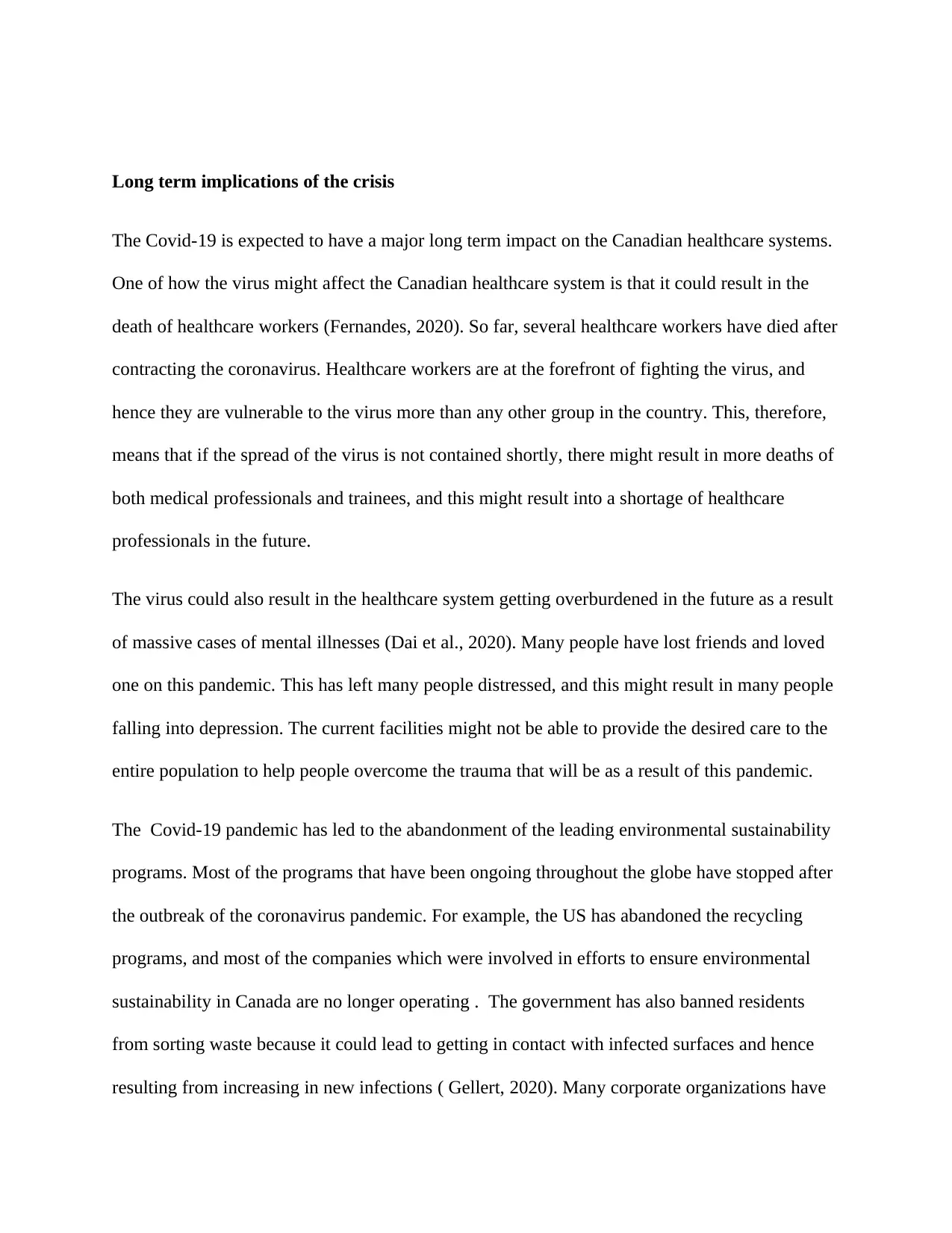
Long term implications of the crisis
The Covid-19 is expected to have a major long term impact on the Canadian healthcare systems.
One of how the virus might affect the Canadian healthcare system is that it could result in the
death of healthcare workers (Fernandes, 2020). So far, several healthcare workers have died after
contracting the coronavirus. Healthcare workers are at the forefront of fighting the virus, and
hence they are vulnerable to the virus more than any other group in the country. This, therefore,
means that if the spread of the virus is not contained shortly, there might result in more deaths of
both medical professionals and trainees, and this might result into a shortage of healthcare
professionals in the future.
The virus could also result in the healthcare system getting overburdened in the future as a result
of massive cases of mental illnesses (Dai et al., 2020). Many people have lost friends and loved
one on this pandemic. This has left many people distressed, and this might result in many people
falling into depression. The current facilities might not be able to provide the desired care to the
entire population to help people overcome the trauma that will be as a result of this pandemic.
The Covid-19 pandemic has led to the abandonment of the leading environmental sustainability
programs. Most of the programs that have been ongoing throughout the globe have stopped after
the outbreak of the coronavirus pandemic. For example, the US has abandoned the recycling
programs, and most of the companies which were involved in efforts to ensure environmental
sustainability in Canada are no longer operating . The government has also banned residents
from sorting waste because it could lead to getting in contact with infected surfaces and hence
resulting from increasing in new infections ( Gellert, 2020). Many corporate organizations have
The Covid-19 is expected to have a major long term impact on the Canadian healthcare systems.
One of how the virus might affect the Canadian healthcare system is that it could result in the
death of healthcare workers (Fernandes, 2020). So far, several healthcare workers have died after
contracting the coronavirus. Healthcare workers are at the forefront of fighting the virus, and
hence they are vulnerable to the virus more than any other group in the country. This, therefore,
means that if the spread of the virus is not contained shortly, there might result in more deaths of
both medical professionals and trainees, and this might result into a shortage of healthcare
professionals in the future.
The virus could also result in the healthcare system getting overburdened in the future as a result
of massive cases of mental illnesses (Dai et al., 2020). Many people have lost friends and loved
one on this pandemic. This has left many people distressed, and this might result in many people
falling into depression. The current facilities might not be able to provide the desired care to the
entire population to help people overcome the trauma that will be as a result of this pandemic.
The Covid-19 pandemic has led to the abandonment of the leading environmental sustainability
programs. Most of the programs that have been ongoing throughout the globe have stopped after
the outbreak of the coronavirus pandemic. For example, the US has abandoned the recycling
programs, and most of the companies which were involved in efforts to ensure environmental
sustainability in Canada are no longer operating . The government has also banned residents
from sorting waste because it could lead to getting in contact with infected surfaces and hence
resulting from increasing in new infections ( Gellert, 2020). Many corporate organizations have
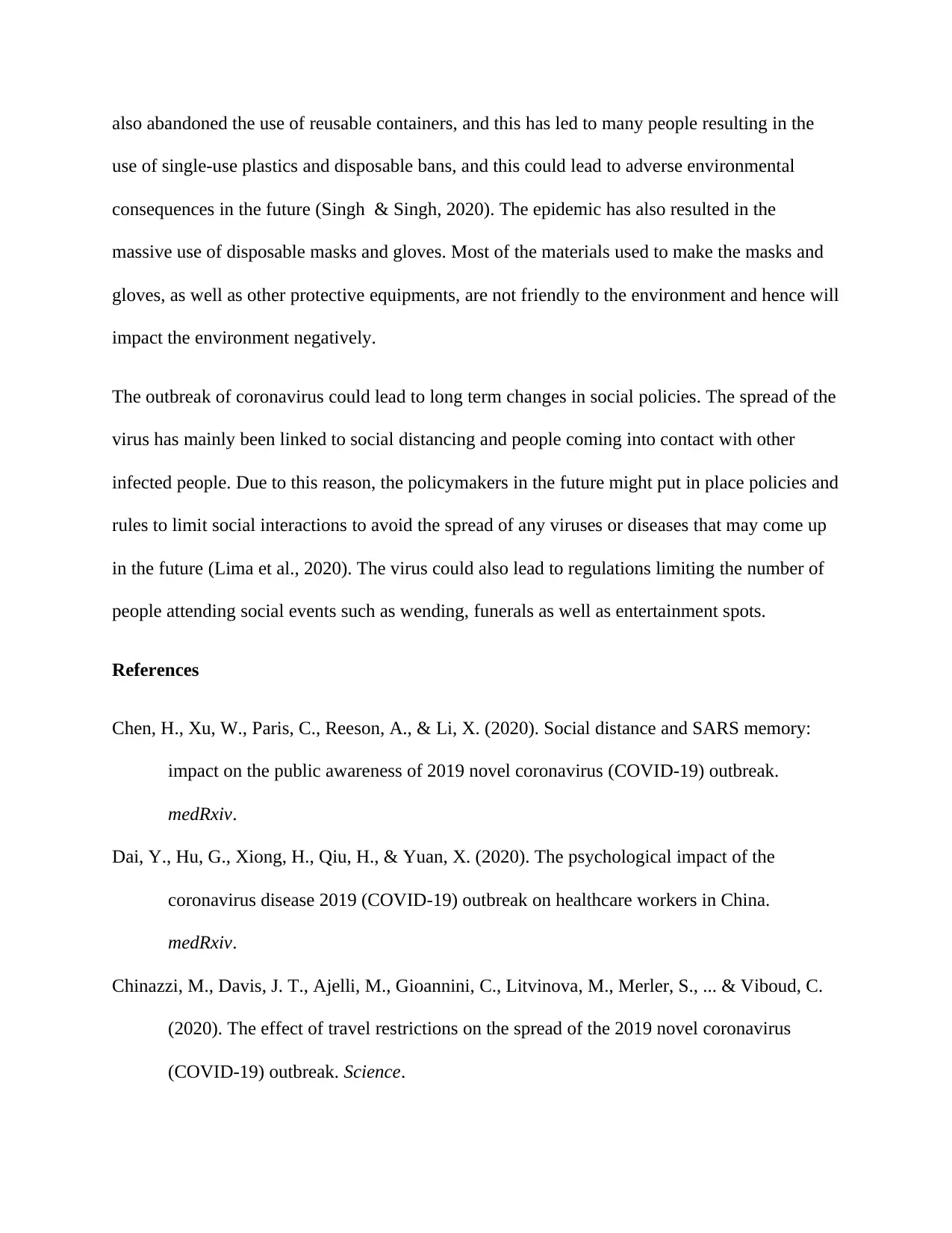
also abandoned the use of reusable containers, and this has led to many people resulting in the
use of single-use plastics and disposable bans, and this could lead to adverse environmental
consequences in the future (Singh & Singh, 2020). The epidemic has also resulted in the
massive use of disposable masks and gloves. Most of the materials used to make the masks and
gloves, as well as other protective equipments, are not friendly to the environment and hence will
impact the environment negatively.
The outbreak of coronavirus could lead to long term changes in social policies. The spread of the
virus has mainly been linked to social distancing and people coming into contact with other
infected people. Due to this reason, the policymakers in the future might put in place policies and
rules to limit social interactions to avoid the spread of any viruses or diseases that may come up
in the future (Lima et al., 2020). The virus could also lead to regulations limiting the number of
people attending social events such as wending, funerals as well as entertainment spots.
References
Chen, H., Xu, W., Paris, C., Reeson, A., & Li, X. (2020). Social distance and SARS memory:
impact on the public awareness of 2019 novel coronavirus (COVID-19) outbreak.
medRxiv.
Dai, Y., Hu, G., Xiong, H., Qiu, H., & Yuan, X. (2020). The psychological impact of the
coronavirus disease 2019 (COVID-19) outbreak on healthcare workers in China.
medRxiv.
Chinazzi, M., Davis, J. T., Ajelli, M., Gioannini, C., Litvinova, M., Merler, S., ... & Viboud, C.
(2020). The effect of travel restrictions on the spread of the 2019 novel coronavirus
(COVID-19) outbreak. Science.
use of single-use plastics and disposable bans, and this could lead to adverse environmental
consequences in the future (Singh & Singh, 2020). The epidemic has also resulted in the
massive use of disposable masks and gloves. Most of the materials used to make the masks and
gloves, as well as other protective equipments, are not friendly to the environment and hence will
impact the environment negatively.
The outbreak of coronavirus could lead to long term changes in social policies. The spread of the
virus has mainly been linked to social distancing and people coming into contact with other
infected people. Due to this reason, the policymakers in the future might put in place policies and
rules to limit social interactions to avoid the spread of any viruses or diseases that may come up
in the future (Lima et al., 2020). The virus could also lead to regulations limiting the number of
people attending social events such as wending, funerals as well as entertainment spots.
References
Chen, H., Xu, W., Paris, C., Reeson, A., & Li, X. (2020). Social distance and SARS memory:
impact on the public awareness of 2019 novel coronavirus (COVID-19) outbreak.
medRxiv.
Dai, Y., Hu, G., Xiong, H., Qiu, H., & Yuan, X. (2020). The psychological impact of the
coronavirus disease 2019 (COVID-19) outbreak on healthcare workers in China.
medRxiv.
Chinazzi, M., Davis, J. T., Ajelli, M., Gioannini, C., Litvinova, M., Merler, S., ... & Viboud, C.
(2020). The effect of travel restrictions on the spread of the 2019 novel coronavirus
(COVID-19) outbreak. Science.
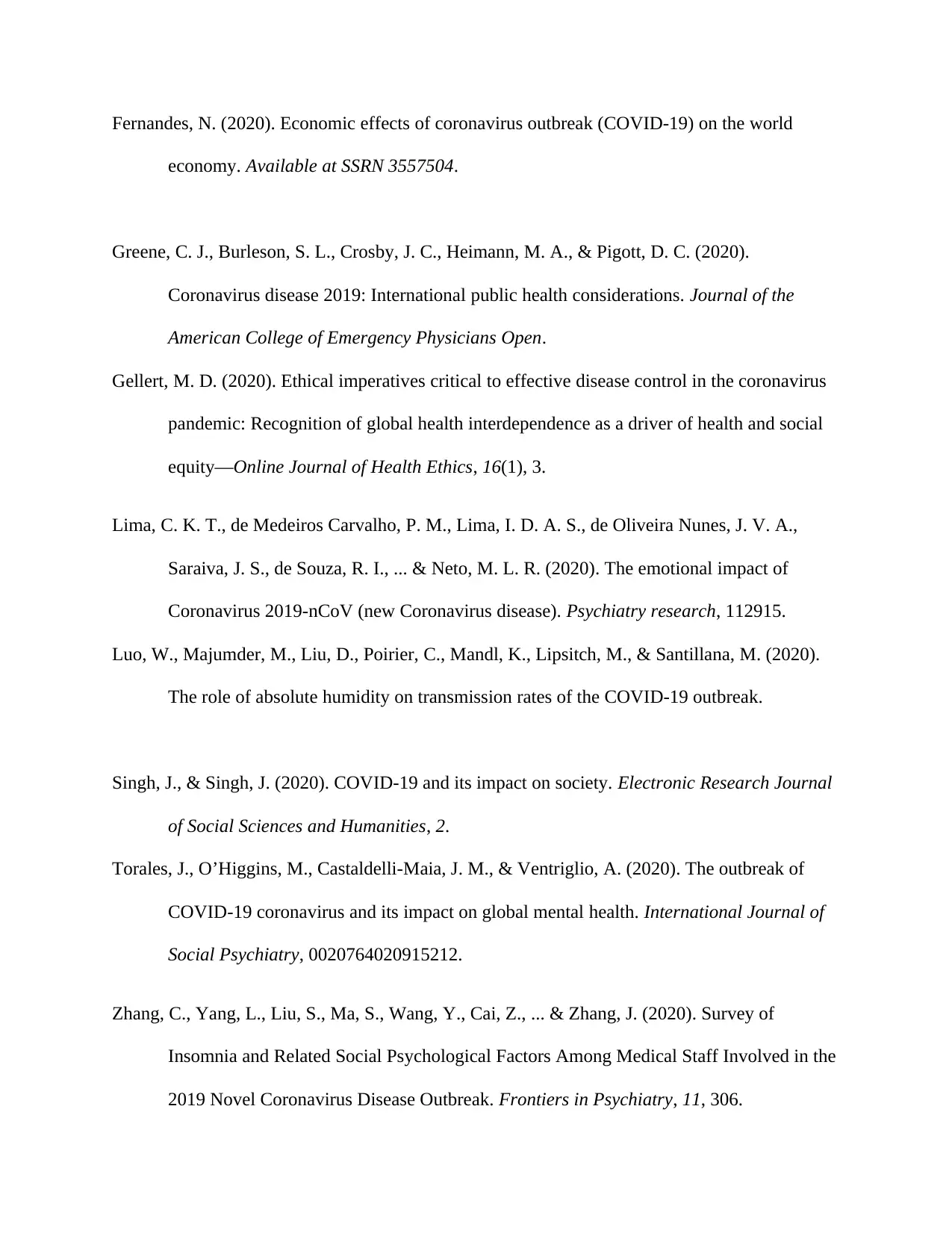
Fernandes, N. (2020). Economic effects of coronavirus outbreak (COVID-19) on the world
economy. Available at SSRN 3557504.
Greene, C. J., Burleson, S. L., Crosby, J. C., Heimann, M. A., & Pigott, D. C. (2020).
Coronavirus disease 2019: International public health considerations. Journal of the
American College of Emergency Physicians Open.
Gellert, M. D. (2020). Ethical imperatives critical to effective disease control in the coronavirus
pandemic: Recognition of global health interdependence as a driver of health and social
equity—Online Journal of Health Ethics, 16(1), 3.
Lima, C. K. T., de Medeiros Carvalho, P. M., Lima, I. D. A. S., de Oliveira Nunes, J. V. A.,
Saraiva, J. S., de Souza, R. I., ... & Neto, M. L. R. (2020). The emotional impact of
Coronavirus 2019-nCoV (new Coronavirus disease). Psychiatry research, 112915.
Luo, W., Majumder, M., Liu, D., Poirier, C., Mandl, K., Lipsitch, M., & Santillana, M. (2020).
The role of absolute humidity on transmission rates of the COVID-19 outbreak.
Singh, J., & Singh, J. (2020). COVID-19 and its impact on society. Electronic Research Journal
of Social Sciences and Humanities, 2.
Torales, J., O’Higgins, M., Castaldelli-Maia, J. M., & Ventriglio, A. (2020). The outbreak of
COVID-19 coronavirus and its impact on global mental health. International Journal of
Social Psychiatry, 0020764020915212.
Zhang, C., Yang, L., Liu, S., Ma, S., Wang, Y., Cai, Z., ... & Zhang, J. (2020). Survey of
Insomnia and Related Social Psychological Factors Among Medical Staff Involved in the
2019 Novel Coronavirus Disease Outbreak. Frontiers in Psychiatry, 11, 306.
economy. Available at SSRN 3557504.
Greene, C. J., Burleson, S. L., Crosby, J. C., Heimann, M. A., & Pigott, D. C. (2020).
Coronavirus disease 2019: International public health considerations. Journal of the
American College of Emergency Physicians Open.
Gellert, M. D. (2020). Ethical imperatives critical to effective disease control in the coronavirus
pandemic: Recognition of global health interdependence as a driver of health and social
equity—Online Journal of Health Ethics, 16(1), 3.
Lima, C. K. T., de Medeiros Carvalho, P. M., Lima, I. D. A. S., de Oliveira Nunes, J. V. A.,
Saraiva, J. S., de Souza, R. I., ... & Neto, M. L. R. (2020). The emotional impact of
Coronavirus 2019-nCoV (new Coronavirus disease). Psychiatry research, 112915.
Luo, W., Majumder, M., Liu, D., Poirier, C., Mandl, K., Lipsitch, M., & Santillana, M. (2020).
The role of absolute humidity on transmission rates of the COVID-19 outbreak.
Singh, J., & Singh, J. (2020). COVID-19 and its impact on society. Electronic Research Journal
of Social Sciences and Humanities, 2.
Torales, J., O’Higgins, M., Castaldelli-Maia, J. M., & Ventriglio, A. (2020). The outbreak of
COVID-19 coronavirus and its impact on global mental health. International Journal of
Social Psychiatry, 0020764020915212.
Zhang, C., Yang, L., Liu, S., Ma, S., Wang, Y., Cai, Z., ... & Zhang, J. (2020). Survey of
Insomnia and Related Social Psychological Factors Among Medical Staff Involved in the
2019 Novel Coronavirus Disease Outbreak. Frontiers in Psychiatry, 11, 306.
Paraphrase This Document
Need a fresh take? Get an instant paraphrase of this document with our AI Paraphraser

1 out of 8
Related Documents
Your All-in-One AI-Powered Toolkit for Academic Success.
+13062052269
info@desklib.com
Available 24*7 on WhatsApp / Email
![[object Object]](/_next/static/media/star-bottom.7253800d.svg)
Unlock your academic potential
© 2024 | Zucol Services PVT LTD | All rights reserved.





